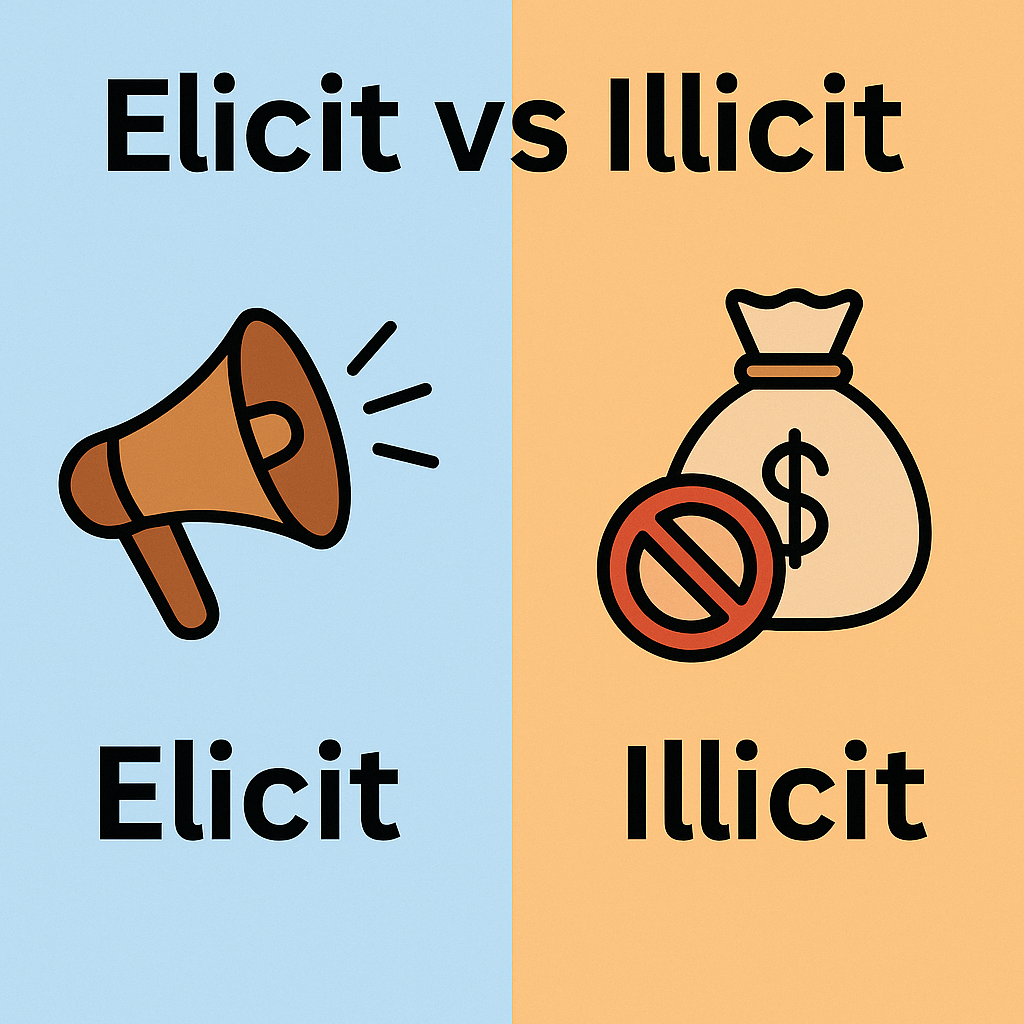Elicit vs Illicit

The words elicit vs illicit often confuse writers and English learners alike. Despite sounding similar, these two words differ completely in meaning, function, and usage. One refers to drawing out a response, while the other describes something illegal or forbidden.
Why is the difference between elicit vs illicit important? Because using one in place of the other can lead to misunderstandings especially in formal writing.
In this guide, we’ll break down the grammar behind each word, show examples in real-life situations, correct common mistakes, and share memory tips to help you always choose the right one. Let’s clear up the confusion between elicit vs illicit once and for all.
Grammatical Explanation
Let’s dive into the grammar behind elicit vs illicit:
- Elicit is a verb that means to draw out or bring forth, usually a reaction, answer, or response.
Example: The teacher’s question elicited thoughtful replies. It’s typically used when referring to emotional or verbal responses:- He tried to elicit sympathy.
- Her speech elicited applause.
- Illicit is an adjective that means illegal, forbidden, or morally wrong.
Example: The police uncovered an illicit drug operation. It describes actions or behaviors that are not allowed by law or society.- They were involved in illicit trade.
- The movie depicted an illicit relationship.
When comparing elicit vs illicit, remember: one draws out, the other is against the rules.
Real-Life Examples
Let’s look at some real-world examples to understand elicit vs illicit better.
Elicit (verb – to draw out):
- The comedian’s joke elicited laughter from the crowd.
- She tried to elicit the truth through careful questioning.
- His actions were designed to elicit an emotional response.
Illicit (adjective – illegal or immoral):
- He was arrested for engaging in illicit activities.
- The novel explored the consequences of an illicit affair.
- Customs seized the illicit goods hidden in the luggage.
Incorrect usage:
- The speech was illicit a strong reaction.
The speech elicited a strong reaction. - They were caught with elicit substances.
They were caught with illicit substances.
These examples show how clear the difference is when you focus on function and meaning.
Common Mistakes
The biggest mistake when using elicit vs illicit is assuming they are interchangeable because of how they sound. This leads to grammar errors and unclear messages.
- The interview was illicit useful feedback.
The interview elicited useful feedback. - She was found guilty of elicit trading.
She was found guilty of illicit trading.
Another common slip is spelling. Because both words have similar endings, writers sometimes accidentally switch them.
Always ask:
- Am I drawing out something (like a reaction)? → Use elicit
- Am I talking about something illegal or morally wrong? → Use illicit
Memory Tips
Use these tricks to remember the difference between elicit vs illicit:
Elicit = Extract
- Both start with “E.” Think: Elicit = Extract a response.
Illicit = Illegal
- Both start with “Il.” Think: Illicit = Illegal or Immoral.
Mnemonic device:
- “Elicit emotions, illicit actions.”
Ask yourself:
- Does it involve drawing out something? Then it’s elicit.
- Does it involve law-breaking or forbidden acts? Then it’s illicit.
Repeat this to yourself a few times, and you’ll never mix up elicit vs illicit again.
Conclusion
Understanding the difference between elicit vs illicit comes down to recognizing their distinct grammatical roles and meanings. Use elicit to describe drawing out a response, and illicit when referring to something unlawful or forbidden.
Looking to clear up more confusing word pairs? Read our article on Lose vs Loss for another common mix-up.
Need deeper definitions? Visit Merriam-Webster’s entry on illicit for detailed examples and usage.